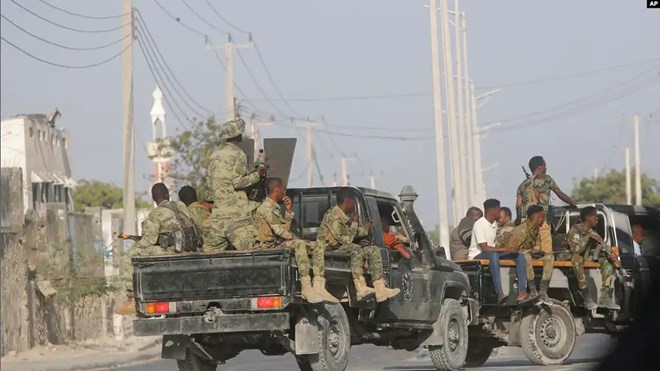
Harun Maruf
Thursday March 2, 2023

FILE - Security patrol the streets during fighting between al-Shabab extremists and soldiers in Mogadishu, Somalia, Feb. 21, 2023. Djibouti, Ethiopia and Kenya have agreed to send additional troops to support Somali forces against al-Shabab, a Somali official said March 1, 2023.
WASHINGTON — The three neighboring countries of Somalia are to send new troops to support Somali forces against al-Shabab in the next phase of military operations, the national security adviser for the Somali president said.
In an interview with VOA's Somali Service on Wednesday, Hussein Sheikh-Ali said Djibouti, Ethiopia and Kenya will be sending troops in addition to the soldiers they already have serving as part of the African Transitional Mission in Somalia, or ATMIS. He said the new troops will not be part of the ATMIS mission.
"It is their plan to be coming inside Somalia within eight weeks," he said.
Ali declined to give specific number of the incoming troops, citing "operational purposes."
"Their role is to jointly plan and jointly operate under the command of the Somali security forces," he said. "So, they will be fighting against al-Shabab alongside Somali forces. That is the plan."
The leaders of the three countries attended a summit hosted by Somali President Hassan Sheikh Mohamud on February 1 in Mogadishu. In a communique at the time, they said they have agreed to jointly plan and organize a robust operational campaign to "search and destroy" al-Shabab on multiple frontlines.
"The time-sensitive campaign will prevent any future infiltrating elements into the wider region," the communique read.Asked why the military operations against al-Shabab have paused recently, Ali said the government is concluding the first phase of the operations.
"It is a calm before the storm," he said. "We are preparing the second phase … and with the support of the extra non-ATMIS forces from our neighboring countries joining the fight, it is a planning time, that's why it looks it is quiet."
He said the objective of the second phase is to be able to take over "every village and town" that al-Shabab is now controlling.
Matt Bryden, a Horn of Africa regional security expert, said the intervention of additional, non-ATMIS forces "could certainly accelerate efforts to degrade and defeat" al-Shabab.
But, he added, "Since the FGS [Federal Government of Somalia] and partners have telegraphed their intentions, al-Shabab is likely to disperse its fighters and avoid direct military engagements as far as possible."
Bryden warned that the success of the second phase offensive will hinge on two key considerations.
"First, planning," he said. "Counterinsurgency operations should be intelligence-led, with clearly defined objectives such as dismantling specific al-Shabab bases and neutralizing high-value jihadist leaders."
The second factor is the availability of holding forces to secure newly recovered territory after the clearing forces have passed through, he said.
"Recent FGS operations against al-Shabab in central Somalia have highlighted the absence of capable holding forces," he added.
Arms embargo
Meanwhile, the Somali government has received a boost in its quest to have the decades-old weapons embargo lifted.
This week, representatives from the United States, United Kingdom, Turkey, Qatar and the United Arab Emirates — five countries that provide security assistance to Somalia — met in Washington, D.C., with Somali officials.
In a statement, the countries said they are committed to supporting Somalia's effort to meet benchmarks on weapons and ammunition management with a view to "fully lift" the arms embargo by the United Nations.
Ali, who attended the meeting, said that to have the backing of the five countries was "significant."
"It was the first time that two Security Council members have openly came up supporting Somalia in lifting arms embargo," he said.
"And it's a very promising five important countries with us to help achieve all the benchmarks that is required for Somalia to achieve before November this year, but also to lobby for Somalia politically within the Security Council."
The U.N. weapons embargo was imposed in 1992 at the height of the civil war in Somalia. In 2013, the U.N. slightly eased the embargo allowing the government to buy light weapons.
Bryden, who previously served as the coordinator for the United Nations Monitoring for Somalia, said lifting the embargo would not alter Somali government access to military hardware.
"Because it is already exempt from many aspects of the embargo or is simply required to notify the U.N. Security Council of arms imports," he said.
"But since the FGS does not directly control any of Somalia's land borders or its major ports, other than Mogadishu, lifting the embargo would potentially make it easier for non-state actors, as well as Somalia's federal member states, to obtain arms and ammunition with no fear of consequences."
Some might say that this is already the case, but it is hard to see how lifting the arms embargo would improve this situation, Bryden added.
This week, the United States delivered the second shipment of weapons to Somalia this year. The 61 tons of AK-47, heavy machine guns, and ammunition arrived off two U.S. Airforce C-17 aircraft at Mogadishu airport.
On January 8, the U.S. announced the donation of $9 million of heavy weapons, equipment including support and construction vehicles, explosive ordinance disposal kits, medical supplies, and maintenance equipment for vehicles and weapons, according to the U.S. Africa Command, or AFRICOM.